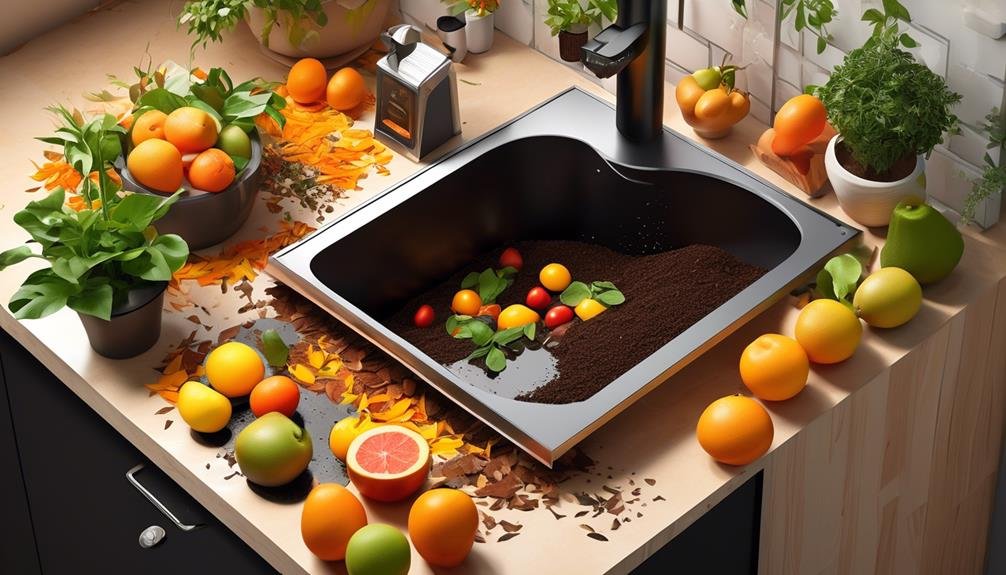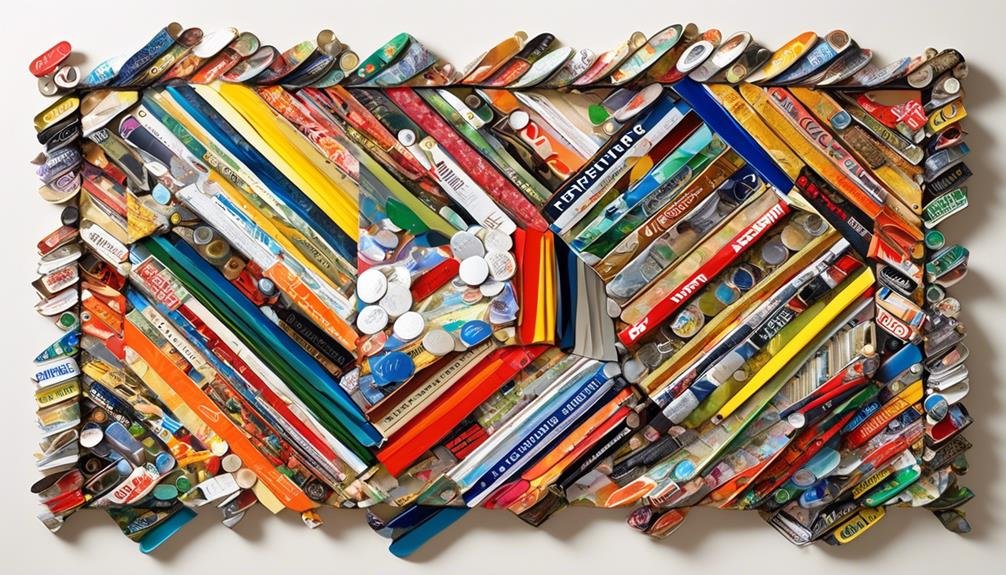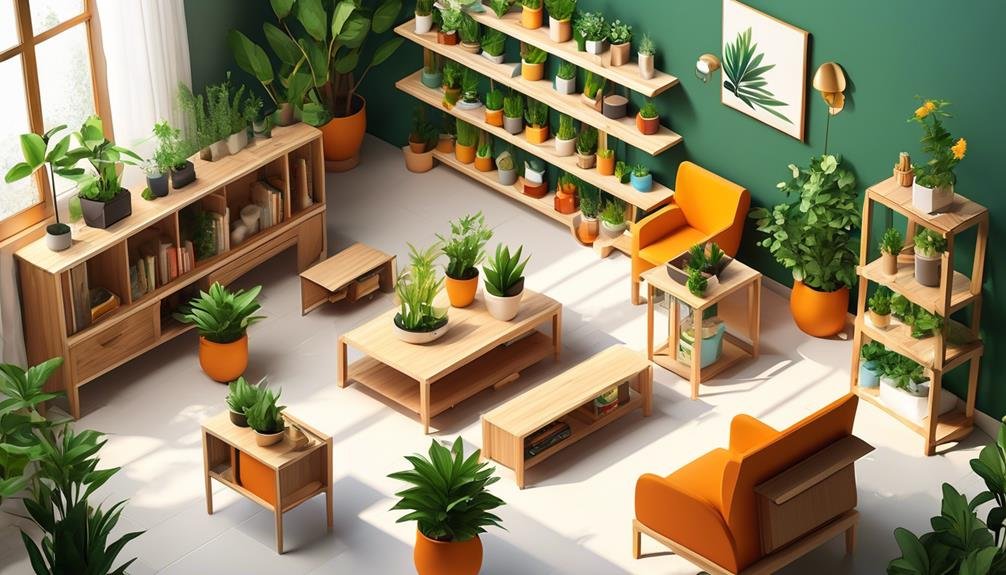Looking around your living space, have you ever wondered what it would be like to have a clutter-free environment? A place where everything has its purpose and nothing is wasted?
In today's society, decluttering sustainably has become a popular trend, and rightfully so. Not only does it help create a clean and organized living space, but it also promotes a more sustainable lifestyle.
So, how can you achieve this? Well, let's explore some of the best ways to declutter sustainably, and you might just find yourself on the path to a more harmonious and eco-friendly living environment.
Key Takeaways
- Repurposing and upcycling old items is a sustainable and creative way to declutter your space. Transforming old items into storage solutions or decorative pieces helps reduce waste and save money.
- Donating unwanted items instead of throwing them away promotes a circular economy and extends the lifespan of items. Supporting charitable organizations allows someone else to benefit from your unwanted items.
- Adopting a minimalist lifestyle and practicing mindful consumption can help declutter your space and reduce waste. By living with less and only purchasing what you truly need, you can create a more organized and peaceful home.
- Recycling, responsible disposal, composting, and organic waste reduction are essential practices for sustainable decluttering. Separating recyclables, recycling electronics, and composting organic waste contribute to reducing environmental impact and promoting the creation of new products from recycled materials.
Repurpose: Give New Life to Old Items
If you have old items lying around that you no longer use, repurposing them is a great way to give them new life and reduce waste. Instead of throwing them away, consider finding creative ways to repurpose them into something useful or decorative. Repurposing not only helps to declutter your space but also contributes to a more sustainable lifestyle.
One option for repurposing old items is to transform them into storage solutions. For example, an old wooden ladder can be repurposed into a unique bookshelf or a coat rack. Mason jars can be used as containers for organizing small items like buttons or office supplies. By repurposing these items, you not only save money on buying new storage solutions but also reduce the demand for new products, ultimately reducing waste.
Another way to repurpose old items is to give them new life as decorative pieces. Old picture frames can be repainted and used to display artwork or photographs. Vintage suitcases can be stacked to create a unique side table or storage unit. By repurposing these items, you add character and charm to your space while reducing the need to buy new decorative items.
Donate: Pass on What You No Longer Need
To reduce waste and make a positive impact, consider donating items you no longer need. Donating is a great way to declutter your home while also benefiting others in need. Here are three reasons why donating is a sustainable option:
- Reduce landfill waste: When you donate items instead of throwing them away, you help reduce the amount of waste that ends up in landfills. By passing on your unwanted items to someone else who can use them, you're extending their lifespan and keeping them out of the waste stream.
- Support charitable organizations: Donating to charitable organizations allows them to continue their important work in the community. Your unwanted items can be sold in thrift stores or given directly to individuals or families in need. By donating, you're supporting these organizations and helping them make a positive impact in the lives of others.
- Promote circular economy: Donating items creates a circular economy where resources are reused and repurposed. When you donate, you give someone else the opportunity to use and enjoy the items, extending their lifecycle and reducing the need for new production.
Minimalism: Embrace a Clutter-Free Lifestyle

Embrace a clutter-free lifestyle by adopting minimalism.
Minimalism is a mindset that encourages you to live with less, focusing on what truly brings you joy and eliminating unnecessary possessions. By consciously reducing the number of items you own, you can create a more organized and serene living space.
One of the key principles of minimalism is to declutter regularly. Take a close look at your belongings and ask yourself if each item serves a purpose or brings you happiness. If not, it's time to let it go. Start by sorting your possessions into categories and then decide which ones you can live without. Remember, minimalism isn't about getting rid of everything, but rather about keeping only what adds value to your life.
Another aspect of minimalism is adopting a more mindful shopping habit. Before making a purchase, ask yourself if you truly need the item and if it aligns with your values. By being intentional about what you bring into your home, you can prevent unnecessary clutter from accumulating.
In addition to creating a clutter-free living space, minimalism can also have positive environmental impacts. By consuming less and being mindful of your purchases, you can reduce waste and minimize your carbon footprint.
Embracing minimalism is a journey that requires commitment and discipline, but the benefits are worth it. By simplifying your life and embracing a clutter-free lifestyle, you can enjoy a more organized and peaceful home. So, start decluttering and embrace the beauty of minimalism.
Recycling: Dispose of Items Responsibly
Dispose of items responsibly by recycling them to minimize waste and contribute to a more sustainable future. Recycling is a key practice that helps reduce the environmental impact of our daily lives. Here are three ways you can recycle responsibly:
- Separate recyclables: Sort your waste into different bins for paper, plastic, glass, and metal. This simple act allows materials to be processed efficiently, ensuring that they can be turned into new products.
- Check local recycling guidelines: Different areas have different recycling programs and regulations. Familiarize yourself with your local guidelines to ensure that you're recycling correctly. This will help prevent contamination and ensure that your efforts are making a positive impact.
- Recycle electronics: Many electronic devices contain valuable materials that can be recovered and reused. Instead of throwing them away, find a local recycling facility that accepts electronics. They'll handle the proper disposal and recycling of these items.
Composting: Reduce Organic Waste in Your Home

Reduce organic waste in your home by implementing composting practices. Composting is an excellent way to recycle your food scraps and yard waste, and it can significantly reduce the amount of organic waste that goes to the landfill.
To start composting, you'll need a compost bin or pile in your backyard. Choose a location that's convenient and easily accessible. You can use a mix of green (nitrogen-rich) and brown (carbon-rich) materials for composting. Green materials include fruit and vegetable scraps, coffee grounds, and grass clippings. Brown materials include leaves, branches, and shredded paper.
Make sure to turn your compost regularly to help speed up the decomposition process. This will ensure that your compost is well-aerated and will break down faster. Keep your compost moist but not too wet, as excessive moisture can lead to a smelly pile.
Avoid adding meat, dairy, or oily foods to your compost, as they can attract pests and take longer to break down. Also, avoid adding weeds or plants that have been treated with pesticides.
Once your compost is ready, you can use it to enrich your soil for gardening or landscaping. Composting is a simple yet effective way to reduce organic waste and create nutrient-rich soil for your plants. Start composting today and make a positive impact on the environment.
Digitalize: Declutter Your Virtual Space
To continue decluttering sustainably, now let's address the digital space and how to efficiently organize and streamline your virtual files and documents.
Here are three effective ways to declutter your virtual space:
- Organize your files: Start by creating folders and subfolders to categorize your files. Use clear and descriptive names for each folder to make it easier to locate specific documents. Consider creating folders based on topics, projects, or time periods. Rearrange files into their respective folders, ensuring a logical and intuitive organization system.
- Delete unnecessary files: Go through your files and delete any documents or files that you no longer need. Be ruthless in your decision-making process. Remove duplicates, outdated versions, and files that are no longer relevant. This will free up valuable storage space and make it easier to find the files you actually need.
- Back up your files: To ensure the safety of your important documents, it's crucial to regularly back up your files. Use cloud storage services or external hard drives to create backups. This won't only protect your files from potential data loss but also enable you to access them from anywhere.
Upcycling: Transform Trash Into Treasure

Looking to give new life to your old items? Discover creative ways to upcycle and transform trash into treasure. Upcycling is a sustainable practice that involves repurposing discarded materials to create something new and valuable. By upcycling, you can reduce waste, save money, and unleash your creativity.
One simple way to upcycle is by turning old glass jars into storage containers or decorative pieces. You can paint them, add labels, or even create a hanging herb garden.
Another idea is to transform old wooden pallets into furniture, such as coffee tables or bookshelves. With a little sanding and painting, you can give these pallets a new purpose.
If you have worn-out clothing or fabrics, consider repurposing them into new items. Old t-shirts can be turned into tote bags or pillowcases, while fabric scraps can become patchwork quilts or rugs. Get creative and think outside the box!
Upcycling isn't only limited to household items. You can also upcycle old electronics by disassembling them and using the parts for other projects. For example, you can turn a broken laptop screen into a digital picture frame or use old computer keyboards to create unique artwork.
The possibilities are endless when it comes to upcycling. By transforming trash into treasure, you can reduce waste, save money, and unleash your creativity. So, start looking around your home and see what treasures you can create!
Conscious Consumerism: Avoid Accumulating Unnecessary Items
Now, let's shift our focus to conscious consumerism and how it can help you avoid accumulating unnecessary items in your home. By practicing conscious consumerism, you can make more intentional decisions about what you bring into your space, reducing clutter and waste.
Here are three ways to embrace conscious consumerism:
- Think before purchasing: Before buying something new, take a moment to consider whether you truly need it. Ask yourself if the item serves a purpose and if it aligns with your values. By being mindful of your purchases, you can avoid accumulating items that will eventually become clutter.
- Prioritize quality over quantity: Instead of buying cheap and disposable items, opt for high-quality products that are built to last. Investing in well-made, durable items not only reduces waste but also saves you money in the long run. Consider buying secondhand or borrowing items when possible to further reduce consumption.
- Support sustainable brands: Look for brands that prioritize sustainability and ethical practices. Research their values, production methods, and materials used. By supporting these brands, you contribute to a more sustainable and responsible marketplace.
Frequently Asked Questions
How Can I Declutter Sustainably Without Contributing to Landfill Waste?
You can declutter sustainably and avoid landfill waste by repurposing items, donating them to charities or thrift stores, and recycling materials whenever possible. There are many ways to reduce your environmental impact while decluttering.
What Are Some Creative Ways to Repurpose Old Items Instead of Throwing Them Away?
Instead of throwing away old items, get creative and repurpose them! You can turn an old ladder into a bookshelf, or transform glass jars into stylish storage containers. The possibilities are endless when you think outside the box.
Can You Provide Tips on How to Declutter and Organize Digital Files Effectively?
To declutter and organize digital files effectively, start by creating a folder structure that makes sense to you. Use clear and descriptive file names, and regularly delete unnecessary files. Backup important files to prevent loss.
Are There Any Specific Items That Should Not Be Donated and Should Be Disposed of in a Different Way?
Some items should not be donated and should be disposed of properly. Examples include expired medication, broken electronics, and hazardous materials like paint or batteries. Check local regulations for guidance on how to dispose of these items safely.
How Can I Incorporate Conscious Consumerism Into My Decluttering Process?
To incorporate conscious consumerism into your decluttering process, focus on reducing waste and making sustainable choices. Consider donating or repurposing items instead of throwing them away, and opt for eco-friendly storage solutions.
Conclusion
In conclusion, by repurposing, donating, embracing minimalism, recycling, composting, digitalizing, upcycling, and practicing conscious consumerism, you can declutter sustainably.
These methods not only help reduce waste but also contribute to a more organized and clutter-free lifestyle.
By making small changes and being mindful of our consumption habits, we can create a more sustainable and environmentally friendly living space.
So, start decluttering today and make a positive impact on the planet.






